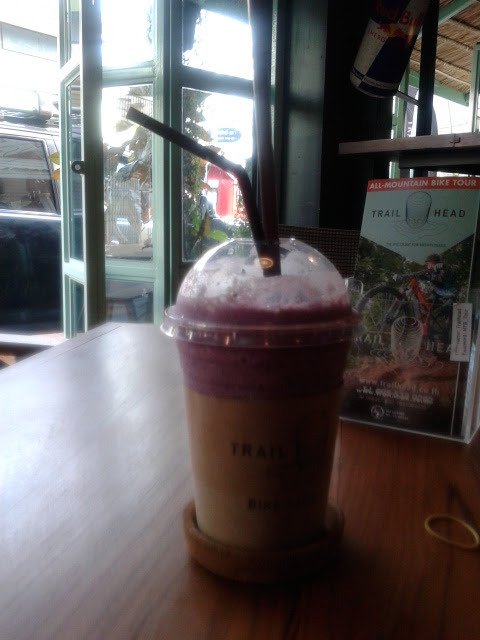I spent the weekend in Pai, a small town located about 146 km north of Chiang Mai, towards the Burmese border. My goal was mostly to get out of Chiang Mai for two days and to find a pool to cool off. Mission accomplished in both cases... As you can tell from the picture above!
Pai is an "interesting" place to visit, and I use the inverted commas because I wasn't a huge fan in the end. It is a very hippie-culture sort of place... very popular with backpackers of the dreadlocked variety. I enjoyed the small-town feel of Pai, but it's always a little strange to me to be in a foreign country but in a place where there is so little interaction between the 'locals' and the 'farang' (foreigners). Case in point: I went to the pool with two nice girls I met at the hostel, and well... it was all foreign tourists with the only locals being behind the bar.
Maybe I should nuance or explain by quoting the Lonely Planet here:
"Unlike Khao San or the islands, Pai (pronounced more like the English ‘bye’, not ‘pie’) is just as popular among Thais as foreigners. During the peak of the cool season (December and January), thousands of Thais from Bangkok crowd into the town, making parts of it feel more like the Chatuchak Weekend Market than a village in Mae Hong Son. Traffic jams aren’t unusual during this time of year, and accommodation becomes so scarce that many are forced to rough it in tents.Despite all this, the town’s popularity has yet to negatively impact its nearly picture-perfect setting in a mountain valley. There’s heaps of quiet accommodation outside the main drag, a host of natural, lazy activities to keep visitors entertained, a vibrant art and music scene, and the town’s Shan roots can still be seen in its temples, quiet back streets and fun afternoon market."From: http://www.lonelyplanet.com/thailand/mae-hong-son-province/pai/introduction#ixzz449xJOll9
- About 5-6% of the Thai population adheres to Islam. However there is an enormous diversity of "Islams" in Thailand... from Chinese Muslims in Northern Thailand, to Malay Muslims in the 'Deep South" provinces of Patani, Yala and Narathiwat.
- The Thai government wishes to project an image of a unified country, but in fact there are many separatist groups in the Deep South, who do not identify strongly with Thailand as a whole. As one article in Asian Correspondent noted, "The Thai-Muslim sense of identity will need accommodation within existing narratives of what is ‘Thainess’ today. “Thainess’ will have to allow some plurality in the future." Southern-Malay Thais speak mostly Malay, are Muslim and share more cultural affinities with Malaysia than with Thailand.
- I was frankly shocked to hear about the conflict that has been raging in Thailand's southernmost provinces since about 2004-2007. It seems that no-one outside of Thailand has heard about this...but it is a very real and devastating conflict, with roots going back to the annexation of Pattani and the division of the area between Thailand and Malaysia, under a 1909 deal between Britain and the kingdom of Siam. Since 2004, estimates show that more than 6,300 people have been killed. It's an all-too-familiar story of "one man's terrorist is another man's freedom fighter" with insurgents saying that they are struggling to restore their homeland, and the Thai government on the other hand vowing to stamp out terrorism and separatism. What's most tragic in my opinion is the level of targeting of the civilian population... 89% of the victims have been civilian casualties. Schools, teachers, monks and imams are often victims of insurgency bombings. In 2013, the Thai government and rebel factions began peace negotiations but these have amounted to nothing to date. Perhaps the government feels it has bigger fish to fry with the deep political divisions between royalist elites and middle-class rural voters from the provinces...
- I wish there was something to do about this conflict, but for now, I guess all I can do is talk about it, and encourage my friends to find out and support campaigns such as Oxfam Thailand's campaign to support business opportunities for poor women in the conflict-affected provinces. It's not enough but hopefully things will change in Thailand and the country can begin to heal itself.











